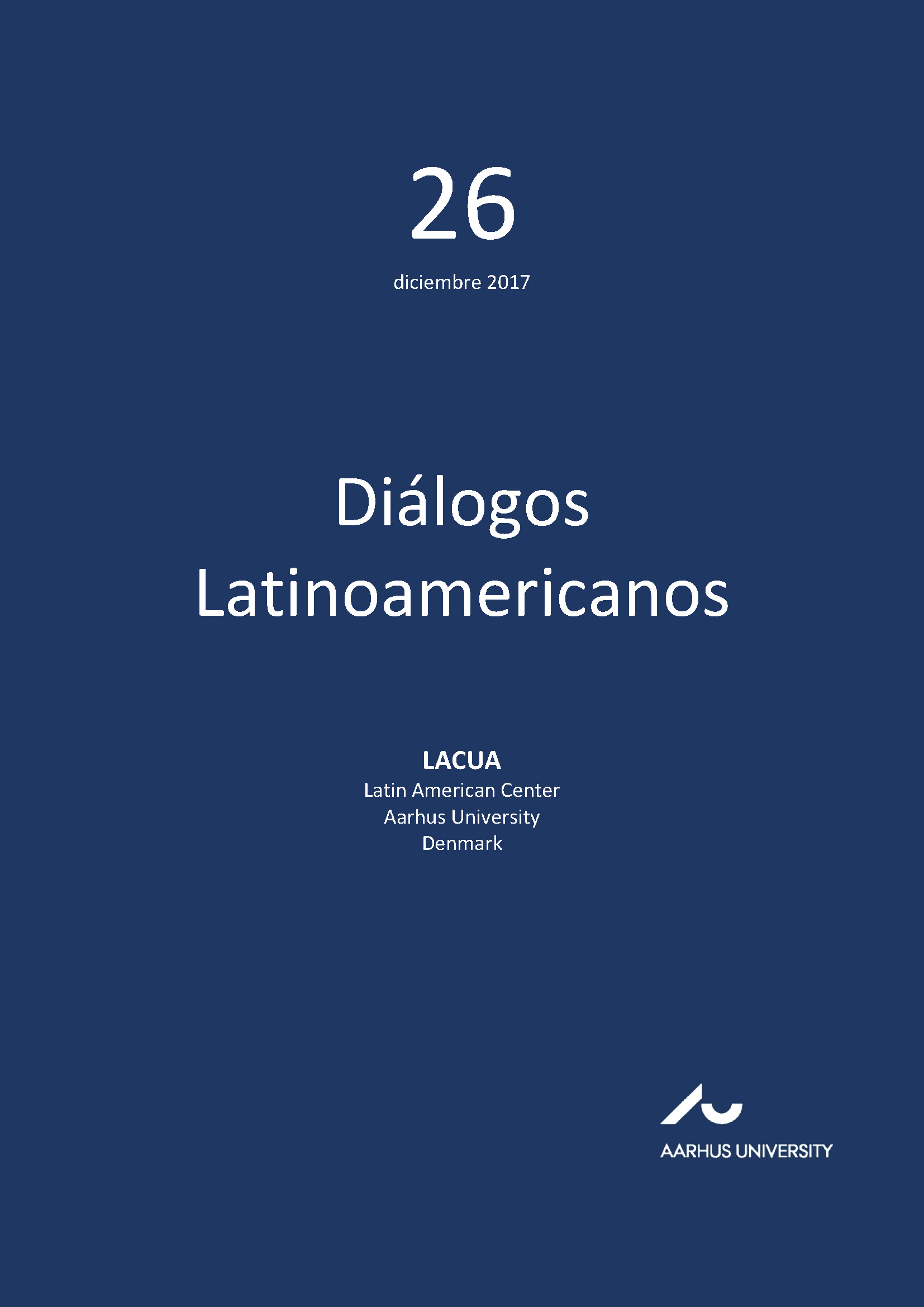Agricultural Frontiers as Controversial Place-making Territories
DOI:
https://doi.org/10.7146/dl.v18i26.112862Keywords:
place soybean, landscape, agribusiness, Mato Grosso, BrazilAbstract
The intricacies of one of the most relevant agricultural frontiers in the world today – the State of Mato Grosso, in the Brazilian Amazon – are considered through an examination of place-making. Vast areas of rainforest and savannah were converted, since the 1970s, into places of intensive farming, to fulfil exogenous demands for land and agricultural production. Instead of merely studying the constellation of interconnected places, we examine the politicised genesis of the emerging places and their trajectory under socio-ecological disputes. Empirical results reveal three main moments of place-making characterised, respectively, by displacement, replacement and misplacement. In order to understand those intricate processes, it is necessary a qualitative intellectual jump: from place-making on the frontier to place-making as an ontological frontier in itself. Mato Grosso remains an unsettled frontier between a new socio-spatiality (shaped by fast economic growth) and the perpetuation of old practices (marked by exclusion and tensions).
References
Barros, M. (2013) Poesia completa. São Paulo: LeYa.
Brannstrom, C. & Neuman, M. (2009) ‘Inventing the “Magic Valley” of South Texas, 1905-1941’. Geographical Review 99: 123–145.
Buarque de Holanda, S. (1994) Caminhos e fronteiras. São Paulo: Companhia das Letras.
Connor, T. K. (2012) ‘The Frontier Revisited: Displacement, Land and Identity among Farm Labourers in the Sundays River Valley’. Journal of Contemporary African Studies 30: 289–311.
Cunha, J. M. P. (2006) ‘Dinâmica migratória e o processo de ocupação do Centro-Oeste Brasileiro: O caso de Mato Grosso’. Revista Brasileira de Estudos de População 23: 87–107.
Deininger, K. W. & Byerlee, D. (2011) Rising Global Interest in Farmland. Washington D.C.: World Bank.
Dias, E. A. & Bortoncello, O. (2003) Resgate histórico do Município de Sorriso. Cuiabá: Edição das autoras.
Elias, D. (2007) ‘Agricultura e produção de espaços urbanos não metropolitanos: Notas teórico-metodológicas’, in M. E. B. Sposito (ed.) Cidades médias: espaços em transição. São Paulo Expressão Popular, 113–138.
Helfand, S. M. & Rezende, G. C. (2004) ‘The Impact of Sector-specific and Economy-wide Policy Reforms on the Agricultural Sector in Brazil: 1980-98’. Contemporary Economic Policy 22: 194–212.
Heredia, B.; Palmeira, M. & Leite, S. P. (2010) ‘Sociedade e economia do ‘agronegócio’ no Brasil’. Revista Brasileira de Ciências Sociais 25: 159–196.
Ioris, A. A. R. (2012) ‘Applying the Strategic-relational Approach to Urban Political Ecology: The Water Management Problems of the Baixada Fluminense, Rio de Janeiro, Brazil’. Antipode 44: 122–150.
Ioris, A. A. R. (2015) ‘Cracking the Nut of Agribusiness and Global Food Insecurity: In Search of a Critical Agenda of Research’. Geoforum 63: 1–4.
Ioris, A. A. R. (2016) ‘Rent of Agribusiness in the Amazon: A Case Study from Mato Grosso’. Land Use Policy 59: 456–466.
Ioris, A. A. R. (2017a) Agribusiness and the Neoliberal Food System in Brazil: Frontiers and Fissures of Agro-neoliberalism. London: Routledge.
Ioris, A. A. R. (2017b) ‘Encroachment and Entrenchment of Agro-neoliberalism in the Centre-West of Brazil’ Journal of Rural Studies 51: 15–27.
Jepson, W., Brannstrom, C. & Filippi, A. (2010) ‘Access Regimes and Regional Land Change in the Brazilian Cerrado, 1972-2002’. Annals of the Association of American Geographers 100: 87–111.
Marx, K. (1973) [1857–1858]. Grundrisse: Foundations of the Critique of Political Economy. Trans. M. Nicolaus. London: Penguin.
Marx, K. (1976) [1867] Capital: A Critique of Political Economy (Volume 1). London: Penguin.
Massey, D. (1994) Space, Place, Gender. Cambridge: Polity Press.
Moreno, G. (2007) Terra e poder em Mato Grosso: política e mecanismos de burla 1892-1992. Cuiabá: EdUFMT/Entrelinhas.
Oliveira, J. M. (1983) A esperança vai na frente: contribuição ao estudo da pequena produção em Mato Grosso, o caso de Sinop. MSc dissertation, FFLCH/USP, São Paulo.
Oliveira, A.U. (1989) Amazônia: monopólio, expropriação e conflitos. Campinas: Papirus.
Oliveira, A.U. (2005) ‘BR-163 Cuiabá-Santarém: geopolítica, grilagem, violência e mundialização’, in M. Torres (ed.) Amazônia revelada: os descaminhos ao longo da BR-163. CNPq: Brasília, CNPq, 67–183.
Otsuki, K. (2012) ‘Illegality in Settlement Heterotopias: A Study of Frontier Governance in the Brazilian Amazon’. Environment and Planning D 30: 896–912.
Pierce, J.; Martin, D. G. & Murphy, J. T. (2011) ‘Relational Place-making: The Networked Politics of Place’. Transactions of the Institute of British Geographers 36: 54–70.
Pipino, E. (1982) ‘Não há “inferno verde” (interview by O. Ribeiro)’. Contato 33: 3–6.
Pred, A. & Watts, M. J. (1992) Reworking Modernity: Capitalisms and Symbolic Discontent. New Brunswick: Rutgers University Press.
Rempel, E. T. (2014) Políticas públicas ambientais e seus nexos com a educação: um estudo no Município de Sinop-MT. Cuiabá: EdUFMT.
Santos, J. V. T. (1993) Matuchos: exclusão e luta. Petrópolis: Vozes.
Santos, L. E. F. (2011) Raízes da história de Sinop. Sinop: Arte Design.
Schwantes, N. (1989) Uma cruz em Terranova. São Paulo: Scritta.
Souza, E. A. (2006) Sinop: história, imagens e relatos. Cuiabá: EdUFMT/FAPEMAT.
Turner, J. F. (1920) The Frontier in American History. New York: Henry Holt and Company.
Villas Bôas, O. & Villas Bôas, C. (1994) A Marcha para o Oeste: a epopéia da expedição Roncador-Xingu. São Paulo: Globo.
Webb, W. P. (1952) The Great Frontier. Austin, TX: University of Texas Press.
Downloads
Published
How to Cite
Issue
Section
License
Counting from volume 31 (2022), articles published in Diálogos Latinoamericanos are licensed under CC-BY 4.0. Read more about the license terms here https://creativecommons.org/licenses/by/4.0/.
No Creative Commons license applied on volumes 1-30. All rights reserved by the authors. Readers may download, read, and link to the articles, but they cannot republish the articles.
With the publication of volume 31 (2022), authors retain the full copyright to their articles and give Diálogos Latinoamericanos the right to the first publication. Authors also retain copyright to earlier versions of manuscripts, such as the submitted (pre-print) and the accepted manuscript (post-print).
Copyright to articles published in volumes 1-30 is held by the authors.





